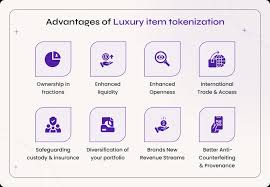IT IS YOUR MONEY
Luxury Goods Authentication via Blockchain
Luxury goods—from handbags to watches—are increasingly authenticated using blockchain to combat counterfeiting and ensure provenance. Each item receives a digital twin linked to its physical counterpart, enabling transparent ownership history and resale verification. Brands like LVMH, Richemont, and Aura Blockchain Consortium are leading this shift. This innovation strengthens consumer trust and unlocks new value in the secondhand market.

The Counterfeit Crisis in Luxury Markets
The global luxury goods market is worth over $400 billion, but up to 70% of items sold online are counterfeit. Fake handbags, watches, and apparel erode brand value, mislead consumers, and deprive creators of revenue. Traditional authentication methods—paper certificates, holograms, and serial numbers—are easily forged or lost.
Blockchain offers a tamper-proof solution by anchoring product identity on a decentralized ledger. Each luxury item is assigned a unique digital identity—often as an NFT or verifiable credential—that records its origin, materials, ownership history, and service records.
This digital passport travels with the product for life, ensuring authenticity across generations of ownership.
How Blockchain Authentication Works
At the point of manufacture, brands embed a secure identifier—such as an NFC chip, QR code, or RFID tag—into the product. This tag links to a blockchain record containing meta production date, artisan details, batch number, and geolocation.
When a customer purchases the item, their identity (optional) is recorded on-chain, creating a transparent chain of custody. Resale platforms like Vestiaire Collective and Rebag use this data to verify authenticity instantly, reducing fraud and increasing consumer confidence.
For example, in 2023, Rolex began piloting blockchain certificates for new watches, allowing owners to verify legitimacy and track service history through a secure app.
Industry Adoption and Consortium Efforts
The Aura Blockchain Consortium, founded by LVMH, Prada, and Richemont, is a leader in luxury authentication. Over 40 brands—including Cartier, Givenchy, and Off-White—now use Aura’s platform to issue digital product passports.
Hermès has tokenized select Birkin bags, enabling owners to verify authenticity and explore resale options within a trusted ecosystem. Similarly, Panerai issues blockchain certificates for its high-end watches, integrating with dealers and insurers for seamless verification.
These initiatives not only fight counterfeiting but also enhance customer experience. Owners can access exclusive content, warranty services, and brand events through their digital identity.
Unlocking Value in the Resale Economy
The secondhand luxury market is projected to reach $75 billion by 2027. Blockchain authentication increases resale value by proving provenance and condition history. A verified vintage Chanel bag can command a 30–50% premium over unverified counterparts.
Platforms like Arianee and Entrupy integrate blockchain with AI-powered image analysis to authenticate items pre-purchase, further strengthening trust.
As consumers prioritize sustainability and authenticity, blockchain becomes a competitive advantage. It transforms luxury goods from static possessions into dynamic, traceable assets with lifelong digital identities.
By merging craftsmanship with digital trust, the luxury industry is setting a new standard for authenticity, transparency, and customer loyalty. This evolution protects brand integrity while empowering consumers with verifiable ownership.
To learn how blockchain authentication is reshaping luxury ownership and investment, visit DigitalAssets.Foundation and speak with experts a FREE consultation.

More News
© 2026
